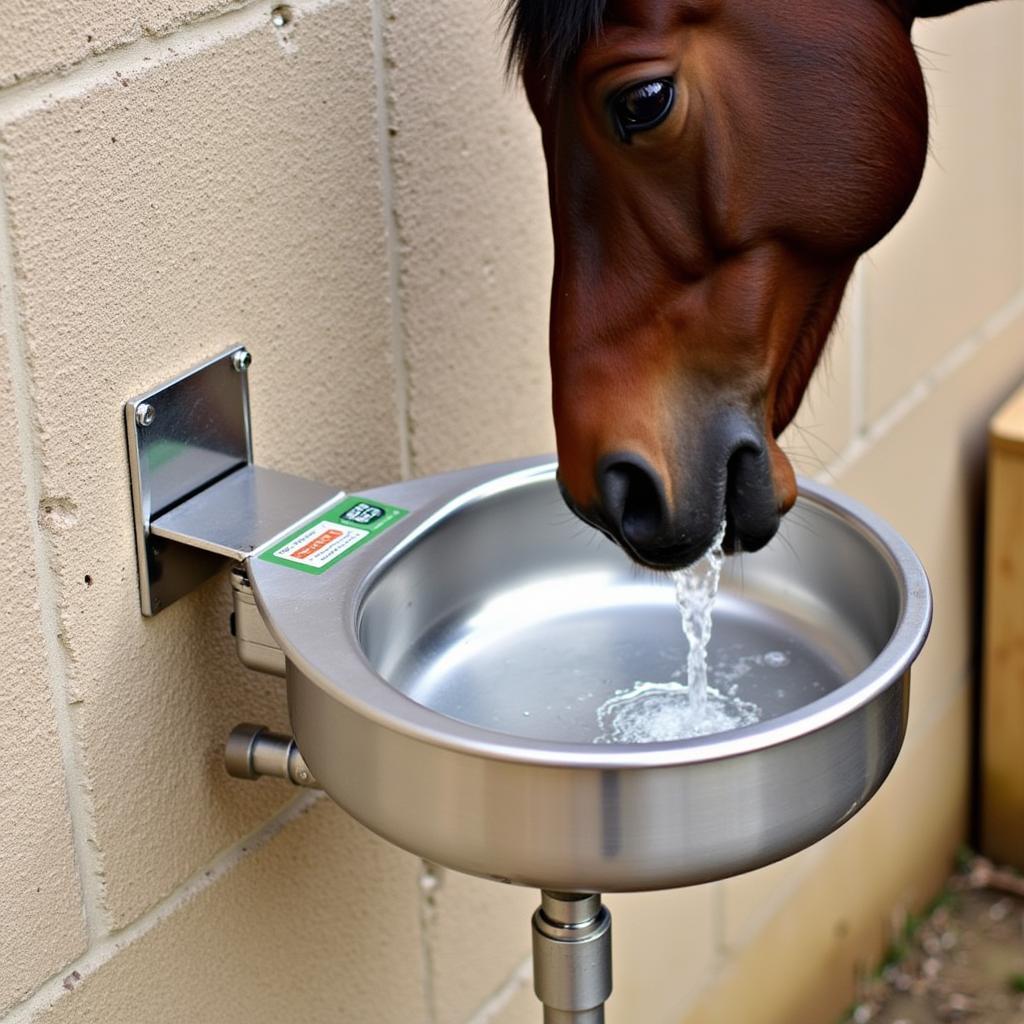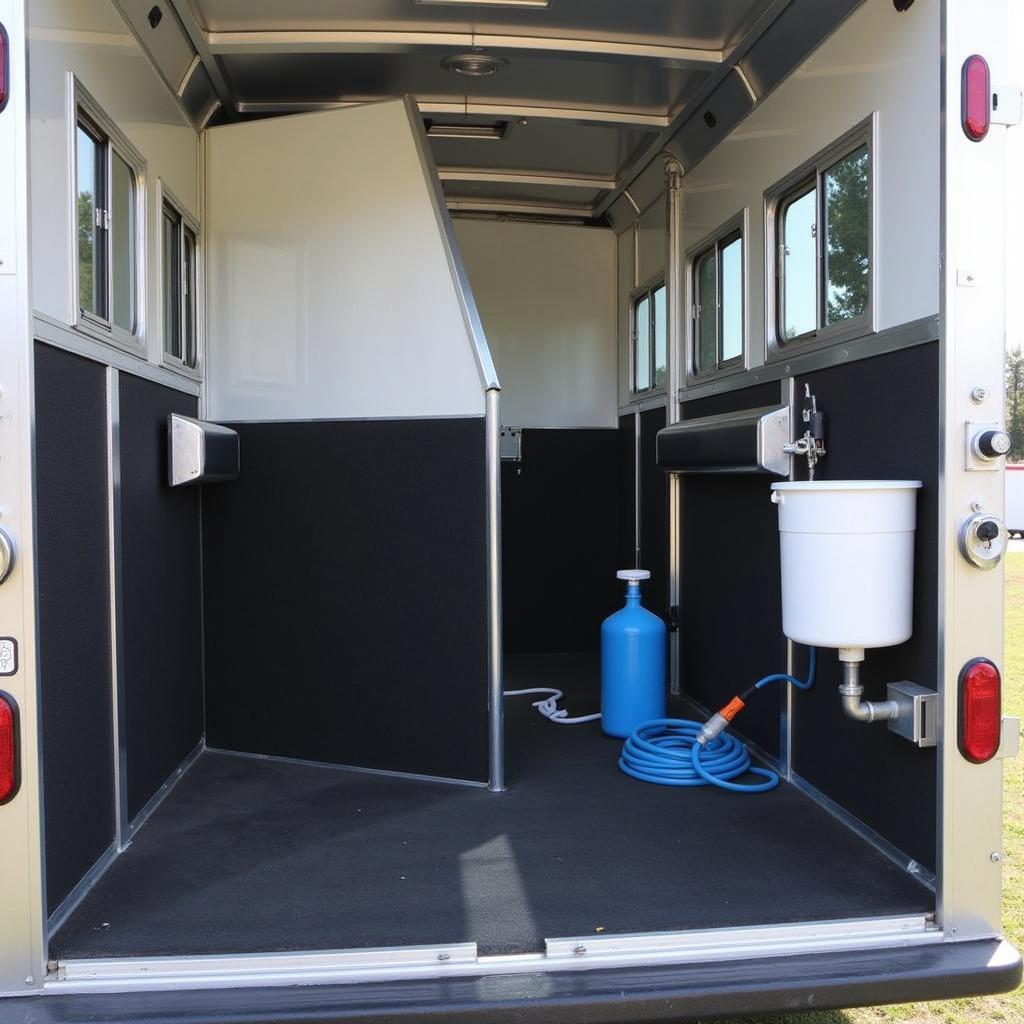Horse Pipes, also known as water pipes for horses, are an essential aspect of equine care, ensuring these majestic animals have access to a clean and reliable water source. Whether you’re a seasoned equestrian or a new horse owner, understanding the different types of horse pipes, their applications, and proper maintenance can contribute significantly to the well-being of your horses.
Types of Horse Pipes and Their Uses
When we talk about horse pipes, we’re often referring to several different products designed to meet various watering needs in a horse stable or pasture:
Automatic Waterers:
These provide horses with a constant supply of fresh water, automatically refilling as the horse drinks. Automatic waterers can be connected directly to a water line, simplifying the watering routine.
 Automatic Horse Waterer in Stable
Automatic Horse Waterer in Stable
Frost-Free Hydrants:
Essential for colder climates, frost-free hydrants prevent water pipes from freezing and bursting during winter. They are installed below the frost line and utilize a unique valve system to drain water after each use.
Water Pipes for Horse Trailers:
These specially designed pipes allow you to provide water to your horses while traveling. They typically connect to a water source at the trailhead or rest stop.
 Horse Trailer Water System
Horse Trailer Water System
Choosing the Right Horse Pipe
The ideal horse pipe depends on several factors, including your climate, your horses’ needs, and your budget.
- Climate: In colder regions, frost-free hydrants and heated waterers are crucial to prevent frozen pipes.
- Number of Horses: Consider the number of horses you have and their water consumption when choosing the size and type of waterer.
- Pasture or Stable: Automatic waterers are suitable for both pastures and stables, while frost-free hydrants are more common in pastures.
Maintaining Horse Pipes
Regular maintenance of your horse pipes ensures their longevity and prevents potential health hazards for your horses:
- Cleaning: Regularly scrub automatic waterers and buckets to remove algae and bacteria buildup.
- Inspection: Check pipes and connections for leaks or damage.
- Winterization: In colder climates, winterize your pipes by draining them or using heat tape to prevent freezing.
Beyond the Basics: Water Quality and Safety
Providing your horses with clean and safe water is paramount. Here are additional considerations:
- Water Testing: Periodically test your water source for contaminants like bacteria, nitrates, and heavy metals.
- Water Temperature: Extremely cold or hot water can deter horses from drinking sufficiently. Aim for a palatable temperature.
- Accessibility: Ensure your horses can easily access the water source, with enough space for them to drink comfortably without feeling crowded.
Integrating Horse Pipes with Other Infrastructure
For optimal horse care, consider how your horse pipes integrate with other elements of your stable or pasture setup:
-
Fencing: Ensure your fencing is safe and secure, preventing horses from coming into contact with water pipes. A safe fence for horses is essential for their well-being.
-
Drainage: Proper drainage around water sources prevents mud and ice buildup, which can create hazardous conditions.
Making Informed Decisions for Your Equine Companions
“When it comes to horse care, every detail matters,” says renowned equine veterinarian Dr. Sarah Williams. “Ensuring access to a clean and reliable water source through properly installed and maintained horse pipes is fundamental to their health and well-being.” By understanding the various types of horse pipes, their applications, and maintenance requirements, you can make informed decisions that contribute to the happiness and longevity of your equine companions.
Frequently Asked Questions about Horse Pipes
1. How often should I clean my horse’s waterer?
Ideally, clean your horse’s waterer at least twice a week. In warmer weather or if multiple horses share the same waterer, more frequent cleaning might be necessary.
2. Can I bury horse pipes underground?
Yes, burying horse pipes underground is a common practice to protect them from freezing temperatures and provide a neater appearance. Use pipes specifically designed for underground installation.
3. How much water does a horse drink per day?
A horse’s water consumption varies depending on factors like breed, activity level, and climate. On average, a horse drinks 5-10 gallons of water per day.
4. What type of pipe is best for a horse waterer?
PVC pipes are commonly used for horse waterers due to their durability, affordability, and resistance to corrosion.
5. How can I prevent my horse’s water from freezing in the winter?
Consider using heated waterers, frost-free hydrants, or insulating your existing water pipes with heat tape or insulation sleeves.
Need Help Choosing the Right Horse Pipe?
Contact us at Justus Horses USA! Our team of experts can guide you towards the best watering solutions for your equine companions.
Phone Number: 0772127271
Email: [email protected]
Address: QGM2+WX2, Vị Trung, Vị Thuỷ, Hậu Giang, Việt Nam
We’re available 24/7 to answer your questions and provide support.